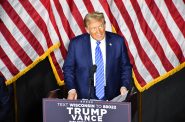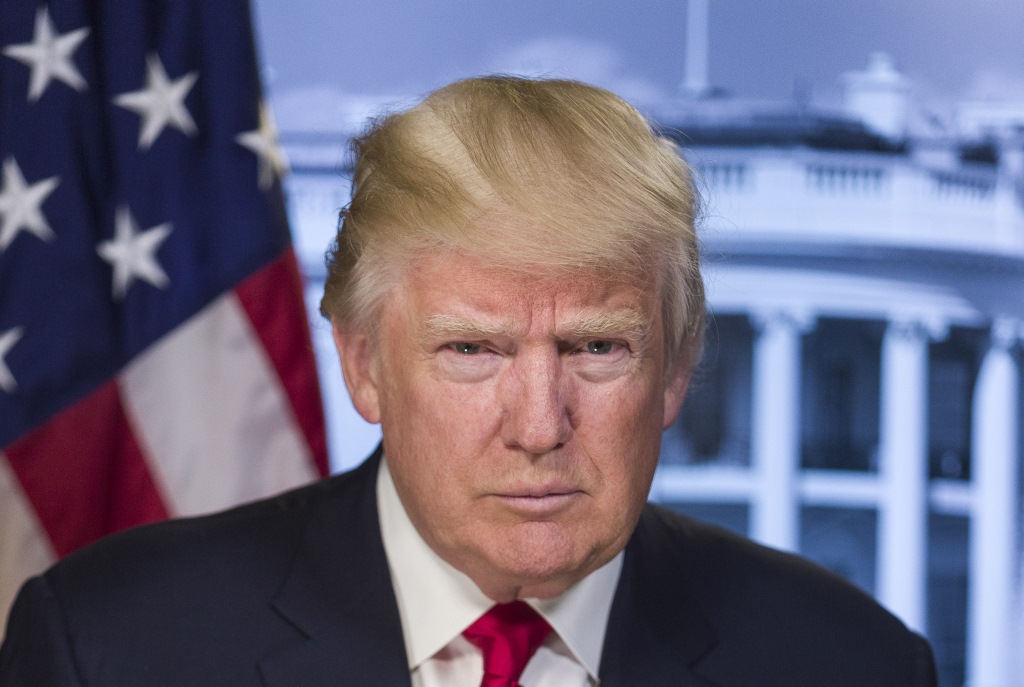How Trump Threatens State’s Exports
As parties flip-flop on free trade, can Wisconsin’s export economy be protected?
For a middle size state, Wisconsin and it employers have borne a remarkable portion of the brunt of President Donald Trump’s war against America’s trading partners. Partly this reflects the targets of Trump’s tweets–Canada, the European Union, Mexico, and China— which account for two-thirds of Wisconsin exports, as shown below, based on 2015 data from the US Census Bureau.
Because of the importance to Wisconsin of these countries, Wisconsin jobs are at risk. As these countries look for ways to strike back at Trump’s tariffs, it’s not surprising if their targets are products from Wisconsin.
Trump’s strategy was problematic for Wisconsin right from the start. A tariff on imports of steel and aluminum, taking a page from the unsuccessful George W. Bush steel tariffs imposed in 2002, will inevitably cost far more Wisconsin jobs than it saved even in the absence of retaliation by America’s trading partners. That’s because there are many more jobs in Wisconsin that depend on using steel than on making it.
Another factor helping make Wisconsin a battlefield likely results from the trading partners’ analysis of American politics. It is no secret that Wisconsin was one of three states whose flip in the 2016 election gave Trump an electoral college majority. In addition, both Governor Scott Walker and House Speaker Paul Ryan have established themselves as major Trump allies. If one was looking for a strategy to pressure the president, targeting Wisconsin industries (including cheese and farm products, which have also been hit with tariffs by the Europeans and Canadians) makes more sense than, say, targeting products made in California, a state Trump treats with disdain.
Finally, there is the case of Harley-Davidson, an early victim of Trump’s trade war. After it was hit with higher costs because of the tariff on imported steel and aluminum, the company made two other business decisions that drew Trump’s ire.
The first was to build a plant in Thailand as reported by Bloomberg:
Harley-Davidson Inc.’s chief executive officer said he decided to build a plant in Thailand when it was clear the U.S. would abandon the Trans-Pacific Partnership, the free-trade agreement President Donald Trump withdrew from last year.
The second came as a response to the EU’s tariffs. Harley submitted a “Regulation FD Disclosure” to the SEC which said (in part):
The European Union has enacted tariffs on various U.S.-manufactured products, including Harley-Davidson motorcycles. These tariffs, … were imposed in response to the tariffs the U.S. imposed on steel and aluminum exported from the EU to the U.S. … Harley-Davidson expects these tariffs will result in an incremental cost of approximately $2,200 per average motorcycle exported from the U.S. to the EU. … In the near-term, the company will bear the significant impact resulting from these tariffs, … On a full-year basis, the company estimates the aggregate annual impact due to the EU tariffs to be approximately $90 to $100 million. To address the substantial cost of this tariff burden long-term, Harley-Davidson will be implementing a plan to shift production of motorcycles for EU destinations from the U.S. to its international facilities to avoid the tariff burden.
Both these decisions by Harley stem directly from Trump policies, but characteristically, Trump takes no responsibility. Instead, he seems to threaten the continued viability of Harley, tweeting without evidence: “I guarantee you everybody that ever bought a Harley Davidson voted for Trump.” And “A Harley-Davidson should never be built in another country-never! Their employees and customers are already very angry at them. If they move, watch, it will be the beginning of the end – they surrendered, they quit! The Aura will be gone and they will be taxed like never before!”
Other companies, including Daimler Benz, General Motors, and Mercury Marine, have pointed out tariffs are likely to lead to job cuts. But in Trump’s view, Harley-Davidson owes a special loyalty to Trump rather than its shareholders.
It is easy to conclude from Trump’s tweets that free trade is on life support. Shortly after Trump took office, Urban Milwaukee published a column from former Milwaukee mayor John Norquist lamenting the decline in support for free trade among prominent politicians: “Bernie Sanders did it. Hillary Clinton changed her pro-trade position during the campaign. Almost no prominent politicians make the case anymore for free trade …”
Yet there is evidence that as many Democratic politicians were flipping to opposing free trade, Democratic voters were becoming the free-trade party. The next graph shows the breakdown by party of voters with opinions on whether they expected Trump’s tariffs on steel and aluminum imports to help the US economy or hurt the US economy, based on the Marquette June poll.
Perhaps partly in reaction to Trump, Norquist’s party is increasingly the party of free trade. Here is the partisan breakdown in the latest Marquette poll of responses to: “In general, do you think that free trade agreements between the US and other countries have been a good thing or a bad thing for the United States?” (As before, I include on those willing to take a position.)
The Marquette Poll has asked this question five times—three during the 2016 election campaign and twice since. Not surprisingly perhaps, the more that Trump has attacked trade agreements, the more Democrats support them. Trump seems to have helped turn Democrats into emphatic free marketers.
More surprising is opinion among Republicans. During the campaign, as Trump won the Republican nomination, Republicans seem to have modified their beliefs to put themselves in sync with their candidate. Since then, however, Republicans have moved in a direction opposite to that suggested by their president.
A global free economy offers many long-term advantages. In the short-run, however, it creates winners and losers. Traditionally, the United States has done a poor job of protecting the losers. The ability of Trump to appeal to people who see the economy as leaving them behind appears to go a long way to explaining his success. If in response, the Democratic Party continues to evolve as the free market party, its willingness to expand the safety net could also be good for capitalism.
More about the Trump Tariffs
- Op Ed: Trump Tariffs Have Failed - John Torinus - Sep 27th, 2020
- Murphy’s Law: Trump Tariffs Slam Wisconsin Economy - Bruce Murphy - Jun 29th, 2020
- Baldwin Calling on Trump Administration to Take Action and Support Wisconsin Hardwood Businesses Hurt by Trade War - U.S. Sen. Tammy Baldwin - Feb 25th, 2020
- Trade War Wounds May Heal Soon - Erik Gunn - Feb 21st, 2020
- How China Trade Agreement Impacts Wisconsin Farmers - Miranda Suarez - Jan 16th, 2020
- Trump Tariffs Have Cost State $800 Million - Miranda Suarez - Dec 10th, 2019
- U.S. Senator Tammy Baldwin Seeks Investigation into Possible Market Manipulation Regarding Market Bets Timed to Trump’s Comments on Trade War & Other Geopolitical Events - U.S. Sen. Tammy Baldwin - Oct 21st, 2019
- Port Milwaukee Shipping Up in 2019 - Danielle Kaeding - Oct 21st, 2019
- Stuck to Gallagher: Does Your Party Care About Small Business? - State Rep. Amanda Stuck - Oct 10th, 2019
- Evers Blasts Trump “Tweet” Trade Wars - Erik Gunn - Sep 16th, 2019
Read more about Trump Tariffs here
Data Wonk
-
The Myth of Immigrant Violence
 Feb 5th, 2025 by Bruce Thompson
Feb 5th, 2025 by Bruce Thompson
-
How Much Did New State Legislative Districts Change?
 Jan 26th, 2025 by Bruce Thompson
Jan 26th, 2025 by Bruce Thompson
-
Crime, Trump’s Claims and The Facts
 Jan 8th, 2025 by Bruce Thompson
Jan 8th, 2025 by Bruce Thompson



























Is anyone really surprised about the unintended consequences of yet another Trump policy disaster ?
-This is the ” businessman ” that ran multiple gambling casinos into bankruptcy.
-The Donald needs to take some life and business instruction from the likes of Warren Buffett.
-So much for : ” And only I can do it “
The saddest part of the analysis is how few people – voters or politicians – are even attempting to think independently and instead quickly devolve into tribalism. It’s horribly depressing that how one evaluates an idea is less about the idea itself and more about who else is supporting the idea and would therefore gain politically.
If Trump were to declare that $2+$2=$5, about 80% of Republicans would support the statement and declare that “intellectual elites” were manipulating science and math to spread fake information. If Trump were to confirm that $2+$2=$4, 80% of Democrats would deride this as a simplistic and subversive policy to support the status quo that only benefits those who actually have $2 to start with.
Trump doesn’t appear to have a clue about trade; it’s just that the word “deficit” sounds bad so it must be stopped. He (and others) don’t seem to realize that it is completely understandable that a richer country with high consumption (the U.S.) would naturally run a trade deficit with less affluent countries that have lower consumption.
A Canadian prime minister can work out a deal to get cheap prices on lifesaving drugs from the Unitedstates and American citizens have to go to Canada to get U.S. drugs but Trump cannot negotiate a good deal for us because Canada is our neighbor and they might get angry.
Troll, Canada didn’t “work out a deal” to get cheaper drug prices, it passed a price-control law 30 years ago. Most countries (but not the US) have similar laws. See details here:
https://www.theglobeandmail.com/opinion/canada-must-and-can-take-control-of-drug-prices/article34999078/
Also, Canada’s drug prices are actually quite high (the worlds 3rd most expensive drug prices). They only seem cheap to us because US prices are so much higher.
How about a new “excess profits” tax on drug manufacturers. Let say we taxed drug manufacturers at 90% on their drug sales (less R&D and 115% of actual manufacturing and distribution—but not marketing—costs). This would replace the regular corporate income tax on drug sales.
This tax would greatly reduce drug prices, give drug companies a (tax-free) 15% profit on actual manufacturing and distribution costs, while still encouraging research.
Also, Canada imposes no restriction on Americans buying drugs in Canada; any restrictions on this practice are imposed by Homeland Security’s ICE.
Transitrider, that is a deal. Why can we not impose deals favorable to us?